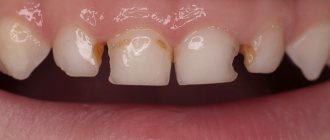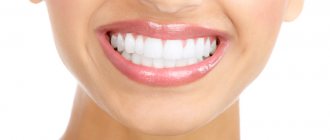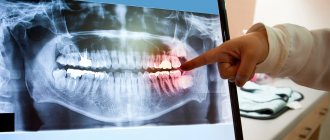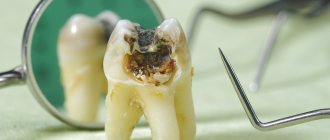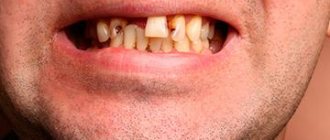Publication date: 01/25/2021
Every person's teeth are designed to last for many years. They have several levels of protection:
- Enamel is a highly durable mineralized tissue that protects the surface of the tooth.
- Dentin is a less hard tissue, but also strong. The main task of dentin is to protect the pulp - the inner tissue. It is the nerve endings in the pulp that signal us about the problem. If the surface layers are broken, we experience pain.
- Cement - covers the roots, protecting them from adverse influences
Overcoming these layers of defense is not easy, but it is possible. And then the teeth rot.
Causes of rotting
In the first place is fear. It is the irrational fear of the dentist, which is difficult to control, that makes us put off visiting the doctor. Often to the point where it is no longer possible to save the tooth. No matter what facts they give us, no matter how much we persuade ourselves, phobias do not lend themselves to rational arguments.
But this is far from the only reason.
General diseases
Our body is a single system. Discord in one place leads to problems in another. Thus, diseases of the gastrointestinal tract cause dental problems.
Infections, fungal diseases, even hormonal imbalances often lead to inflammatory processes in the mouth.
Ecological problems
In regions where drinking water is of poor quality, dental problems are 3-4 times more common. The same picture is observed where there are large industrial enterprises. Increased amounts of toxic microelements in the environment harm overall health and negatively affect teeth.
Diet
There are foods that provoke the growth of bacteria in the oral cavity, which means they contribute to tooth decay. Yes, that same sugar, but not only that. Acids formed during the fermentation of carbohydrates are the main enemies of enamel.
Lifestyle
Addictions of any kind are not good for dental health. Cigarettes, drugs, alcohol are a direct path to problems.
This also includes restrictive diets. Vegetarians, vegans, and Keto fans need to carefully ensure that the body receives all trace elements and vitamins.
Oral diseases
Inflammatory processes in the mouth are a haven for bacteria. Therefore, it is important to regularly carry out sanitation and ultrasonic cleaning of teeth. Periodontal disease, periodontitis, stomatitis, gingevitis, cheilitis require special treatment, which is better not to delay.
Oral hygiene
This is perhaps the easiest way to destroy teeth. All that’s left to do is brush and floss twice a day. 90% of the population does this, but not as carefully as we would like. There are special teeth cleaning schemes. They involve treating surfaces from all sides and for a certain time. Unfortunately, now
90% are those who brush their teeth for less than 1 minute.
Genetic predisposition
Alas, often all preventive measures are not able to help keep teeth safe and sound. Healthy, strong teeth, just like bad ones, are inherited.
Teeth and pregnancy
We found out why children's teeth rot. There is another group of people particularly at risk of tooth decay. These are pregnant women. Some scientists classify pregnancy as an immunodeficiency state - the body's resistance to pathogens decreases to such an extent. It’s no wonder that during pregnancy, general diseases worsen and dental problems begin. The increased content of hormones in the body reduces the barrier ability of the epithelium, microorganisms more easily penetrate the gums and begin to multiply.
Help protect your teeth:
- rational and balanced diet;
- multivitamin complexes;
- professional oral hygiene;
- herbal baths;
- applications with calcium and phosphates.
Online consultation with a doctor
If you are concerned about the condition of your teeth and the symptoms described in this article: putrid odor, pain when biting, sensitivity of the enamel to cold, hot, sour, sweet, dark holes on the tooth, then it is best to undergo an examination and consultation with a dentist. Because these may be symptoms of deep caries, cysts, and other diseases. Bacteria or infection, entering the blood or lymph, affect healthy tissues, causing complications and illnesses. Which, if neglected, will lead to more expensive treatment:
- depulpation;
- dental restoration;
- deletion;
- dental implantation;
- prosthetics;
- treatment of adentia.
Deep caries of wisdom tooth
If the development of the carious process is not stopped in time, the infection will gradually penetrate deeper and eventually reach the pulp. Inflammation in the pulp tissue is called pulpitis and is accompanied by aching pain that is difficult to ignore. It is not easy to treat deep caries of wisdom teeth, since it is necessary to fill the root canals, and the roots of figure eights are usually curved. Untreated pulpitis can develop into more serious diseases - wisdom tooth cyst or periodontitis, which are much more difficult to combat.
Stages of decay development
There is no acute form of caries, so small changes are difficult to notice, they accumulate - and now a person cannot smile, only stumps of teeth remain. Therefore, it is important to undergo preventive examinations regularly. The dentist can identify the problem at the initial stage and can easily fix it.
- Rotting begins at the spot stage. The color of part of the surface changes. Enamel demineralization begins. At this stage, treatment is quick and easy.
- The superficial process of demineralization is increasing, but the pain syndrome has not yet manifested itself. The tooth can react to sweet, sour, cold, hot.
- Middle stage The lesion reaches the enamel-dentin junction. Painful sensations occur periodically. Large areas are affected.
- Deep damage The decay process affects the dentin surrounding the pulp. If this process is left unattended, pulpitis will develop. And this is far from the only problem.
What are the features of dental prosthetics?
Depending on which area is being restored (front or chewing teeth), a method such as dental prosthetics requires an individual approach. Thus, the list of responsibilities of an orthopedic surgeon includes the selection of the necessary material, alignment of restored teeth, and preoperative procedures.
Prosthetics advantages:
- the ability to install a bridge on natural roots. In this case, minimal surgical intervention is performed, the patient does not feel any discomfort. This type of prosthesis is practically no different from natural teeth, which guarantees the patient a beautiful smile.
- a cheaper method than dental implantation;
- Constant improvement of the technique, as a result of which today there is minimal participation of neighboring teeth in the prosthetic process.
- no complications.
To get a consultation
Complications
Bad teeth are a direct path to a heart attack
. When the tooth's protection is destroyed, bacteria enter directly into the bloodstream. There they can provoke the development of blood clots, inflammation of blood vessels, and this leads to the development of coronary artery disease, which is not far from a heart attack.
Gastrointestinal problems
Rotten teeth make it difficult to chew food well. Not only do poorly chewed pieces irritate the mucous membrane, pathogenic flora from damaged teeth enters the stomach and intestines, where they can multiply uncontrollably, causing diseases such as gastritis, pancreatitis, stomach ulcers and duodenal ulcers. Competent gastroenterologists always advise visiting a dentist.
Diseases of the throat and nose
A constant source of infection in the mouth means that any malfunction in the body will cause a relapse of diseases such as sore throat and sinusitis. Purulent infections are dangerous because they can lead to blood poisoning. And such diseases are difficult, often causing complications. Inflammation of the tonsils often causes rheumatism and heart problems. Those who struggle with chronic sinusitis need to especially carefully monitor the condition of the oral cavity. Chronic manifestations will not go away if there are rotten teeth in the mouth.
And the head too
An advanced inflammatory process can spread to the trigeminal nerve. It is closely connected with the brain, and this is a serious matter. Chronic migraines, memory problems, even Alzheimer's disease are associated with oral health. Although there is no direct evidence that Alzheimer's is caused by the same bacteria that cause inflammation in the mouth, it is better to be on the safe side.
Abscesses and cellulitis are also the result of bacterial inflammation.
What to do when the process of tooth decay begins
Modern dentistry is not about pain at all. This is about caring for the patient and the desire to preserve his teeth.
Dentists' advice is simple, but how many people follow it?
How to prevent teeth from rotting:
- Lead a healthy lifestyle
- Takes good care of your teeth
- Carry out hygiene procedures regularly
- Monitor your general health
Plaque on teeth is the beginning of the decay process. Regular cleaning of tartar is one way to keep your teeth healthy.
Why do children's teeth rot?
In children, the composition of saliva is not the same as in adults. Its antibacterial properties are low; in a warm, humid environment, microbes multiply quickly. The disease is not only common, it progresses rapidly. Caries spreads in width and depth. Single events are rare; usually several teeth are affected at once. For children, timely identification and treatment of problem teeth is of particular importance. Rotten teeth can cause:
- pulpitis and periodontitis;
- malocclusion;
- loss of milk and permanent teeth;
- inflammation of the maxillofacial apparatus.
Bad teeth affect the social adaptation of children and lead to psychological problems.
Prevention includes hygiene procedures, limiting sweets, a balanced diet and regular dental examinations.
Treatment
Sick teeth need to be treated, the sooner the better. The dentist’s task is to save the tooth, but if measures are not taken in time, it will have to be removed to avoid serious consequences.
Methods:
- Remineralization Applications of calcium and fluoride preparations and electrophoresis help restore enamel at the initial stage.
- Filling the cavity The affected tissues are removed, their place is filled with filling material.
- Partial prosthetics A crown is placed on the tooth, which protects it from mechanical and biological influences. The crown is placed on a previously depulped, dead tooth.
- Removal If the pulp is affected and the inflammatory process threatens to develop into an abscess, the tooth is pulled out. You should not resist the removal of rotten teeth - they do nothing but harm.
It is easier to prevent any process than to take a long time to eliminate the consequences. By following simple preventive measures and regularly visiting the doctor, you can avoid tooth decay and maintain your smile and self-confidence for many years.
Signs of soft tissue infection
Pus in the gums may appear if, after treatment or tooth extraction, pathogenic microorganisms enter the soft tissues. They destroy healthy cells, which causes suppuration to develop. If treatment is not started at an early stage, pathogenic bacteria will affect deeper and deeper layers of tissue, and can enter other parts of the body through the bloodstream.
Signs of an inflammatory process in the oral cavity are:
- change in the color of the gums - they turn blue, red or dark, swell,
- aching pain when pressing on the affected area of the gum, discharge of pus and blood,
- mobility of one or more teeth - if you do not consult a dentist, they may fall out,
- bad breath.
The patient's health improves slightly when the pus comes out. However, the infectious agents continue to be present in the tissues, so without treatment, a relapse of the inflammatory process or its transition to a chronic form is possible.
